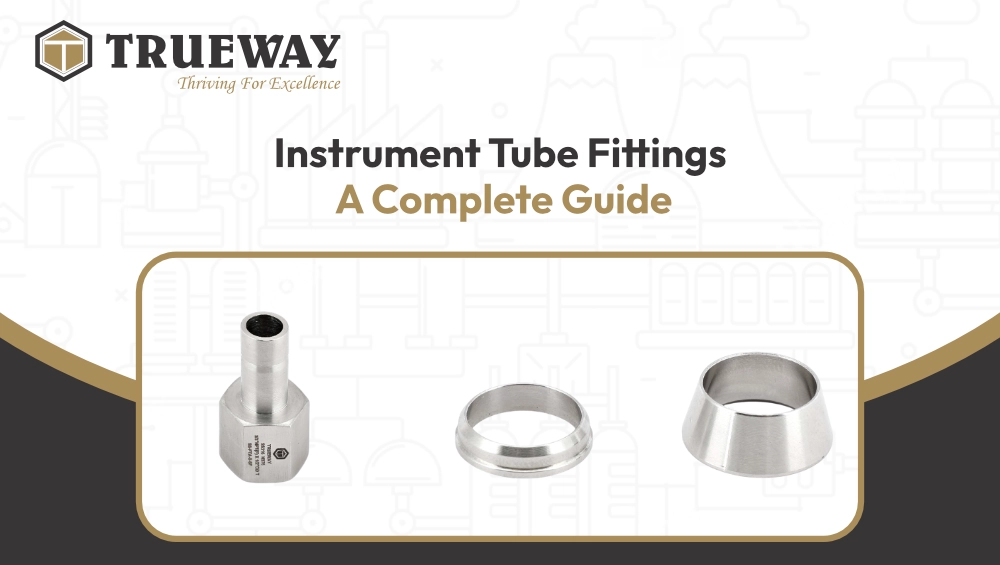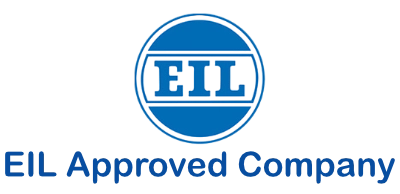
In industrial plants, even a small leak or pressure drop can cause big problems. That’s why instrument tube fittings are so important. They connect tubes, control the flow of liquids and gases, and make connections ideal for high-pressure and leak-proof setups.
Trueway is a trusted manufacturer of high-quality instrument tube fittings. Our products are built with precision to handle high pressure, temperatures, and tough industrial environments. We make your instrumentation lines more secure, leak-proof and durable. Industries like Oil & Gas, Chemical, Fertilizer, Steel, Power and Pharma count on us for safe and smooth operation under demanding conditions. If you are not sure what instrument tube fittings you should buy for your factory or process plant, we are here to help. We’ll give you a clear understanding of types, materials, and applications of instrument tube fittings.
What Are Instrumentation Tube Fittings and Why Are They Important?
Instrumentation tube fittings are precision-engineered connectors designed to provide leak-proof joints between tubes in high-pressure fluid and gas systems, without the need for welding. They are ideal for industries such as refineries, chemical plants, power plants, fertilizer units, and others where accurate control of pressure, temperature, and flow is highly critical.
- Provide leak-tight connections under high pressure and temperature variations.
- Keep the system safe in corrosive, hazardous, or high-vibration conditions.
- Allow accurate control and measurement of flow, pressure, and temperature.
- Allow easy assembly and disassembly for system maintenance and modifications without welding.
- Reduce downtime and operational risks by minimizing leakage, failure, and safety hazards.
- Comply with strict industry standards (ASTM, ASME, DIN) for quality performance.
They are important because they:
Key Components of Tube Fittings & Instrument Valves
The precision inside every tube fitting and instrument valve matters. They consist of carefully designed parts. Each part fulfils a special purpose like sealing tightly, holding the tubes in place, and keeping the flow of liquids or gases safe
- Body – The main part of the fitting that houses all other components and connects the tubes.
- Ferrules (Front & Back Ferrule) – Critical sealing elements that grip the tube and create a leak-tight metal-to-metal seal.
- Nut –Provides the tightening force that compresses the ferrules onto the tube.
Tube Fittings
- Valve Body –The main pressure-retaining structure that houses the flow passage and supports all internal components.
- Bonnet – A cover bolted or threaded to the body, providing containment and sealing around the stem and packing.
- Stem – A shaft that transmits motion from the actuator or handle to the disc, plug, or ball to regulate flow.
- Seat – Precision-machined sealing surface inside the body against which the closure element shuts off flow.
- Packing & Gland – Compression assembly that seals around the stem to prevent fluid leakage while permitting smooth operation.
- Handle or Actuator – Manual lever or powered device (pneumatic, hydraulic, or electric) that drives stem movement for valve operation.
Instrument Valves:
Common Types of Instrument Fittings Used in Industry
Different jobs need different types of fittings. Each type has a special shape and role in tubing systems. Trueway offers a huge range of instrument tube fittings to meet different industry needs.
- Compression Fittings (Single & Double Ferrule) – Provide leak-tight, weld-free joints. Double ferrule design offers better sealing and vibration resistance.
- Flare Fittings – Tube ends flared (37°/45°) to form sealing surfaces; used in high-pressure hydraulic and fuel lines.
- Bite-Type Fittings – Ferrule “bites” into the tube for strong, vibration-resistant connections; suited for hydraulic/pneumatic systems.
- Threaded Tube Fittings – Use male/female threads (NPT, BSP, etc.); often sealed with PTFE or sealants.
- Welded Tube Fittings – Permanently welded; ideal for very high-pressure, high-temperature, or hazardous services.
- Push-to-Connect (Quick Connect) – Tool-free, rapid connections; common in pneumatic and low-pressure systems.
Different Materials Used in Manufacturing Instrument Tubing Fittings
Instrument tubing fittings are made using different materials. The most common ones are - Stainless Steel (SS304, SS316, SS304L, SS316L), Hastelloy, Inconel, Monel, Brass, PTFE, and Carbon Steel. We use these high-grade materials to make fittings that work well in various industrial environments and conditions.
Applications of Tube Fittings and Instrument Valves
Tube fittings and instrument valves are essential for industries that rely on safe, leak proof flow of gases and liquids.
- Oil & Gas Industry – Provide leak-tight connections in systems handling crude, natural gas, and refined products.
- Chemical & Petrochemical Plants – Helps in safe transfer of corrosive and hazardous fluids under high pressure and temperature.
- Pharmaceutical Manufacturing – Support hygienic, leak-tight connections in sterile and contamination-sensitive systems.
- Fertilizer Plants – Handle ammonia, urea, and other reactive chemicals in high-pressure synthesis.
- Power Generation – Make safe connections in fluid handling in high-pressure steam and water circuits of thermal and nuclear power plants.
Tube Fittings
- Process Control Systems – Regulate flow, pressure, and isolation functions in distributed control and SCADA systems.
- Emergency Shutdown (ESD) Systems –Provide fast, reliable isolation during abnormal or hazardous conditions.
- Automated Manufacturing –Enable precise flow regulation in robotic and automated assembly lines.
- Hydraulic & Pneumatic Circuits – Control and stabilize system pressure for efficient equipment operation.
- Thermal Control Systems – Manage fluid and gas flow for accurate heating and cooling in industrial processes.
Instrument Valves
Benefits of Using Quality Fittings from Trusted Manufacturers
Premium quality fittings from a reliable manufacturer like Trueway save money and keep workers safe. Cheap fittings break easily and cause issues later.
- Stop leaks of fluids and liquids that waste materials and harm nature
- Keep workers safe from dangerous accidents due to hazardous leaks
- Manufactured with corrosion-resistant alloys and precision machining that help it last longer
- Withstand high pressure, temperature, and vibration without compromising on performance
- Different sizes and designs are available to suit different plant requirements.
- Meet safety rules and factory standards (ASME, ASTM, ISO, DIN)
Why Trueway is a Trusted Instrumentation Tube Fittings Manufacturer?
Trueway has been producing high-quality instrument tube fittings for many years. We know what factories need and manufacture tube fittings and instrument valves that work perfectly every time. You can rely on us because we-
- Make long-lasting and highly durable fittings
- Comprehensive range of instrument fittings
- Rigorous quality test on each product
- Offer expert help to choose the right fittings
- Deliver products fast when you need them
- Fair prices for excellent quality products
Conclusion
The performance of any fluid system depends on the quality and type of instrument tube fittings in use. Knowing their materials, functions, and installation methods helps you avoid costly problems. Renowned manufacturers like Trueway make sure you get the best quality instrument tube fittings at the best price.
Yes, they are different. Instrument fittings are designed for small-bore tubing systems where leak-tight and precision connections are critical. Pipe fittings, on the other hand, are made for larger pipelines that carry fluids in bulk.
Yes, tube fittings and instrument valves manufactured by us are designed to handle high-pressure conditions. They provide leak-tight connections and resist vibration in demanding fluid and gas systems across industries like oil & gas, power, chemical, and fertilizers.
Instrumentation fittings should be inspected during routine maintenance schedules to check for wear, corrosion, or loosening. They must be replaced immediately if there are signs of leakage, cracks, or deformation.


